【2015中考复习方案】(人教版·河北)2015届九年级英语复习课件(自学反馈+重点突破):第11课时 Units 3—4[八年级下册](共52张PPT)
文档属性
| 名称 | 【2015中考复习方案】(人教版·河北)2015届九年级英语复习课件(自学反馈+重点突破):第11课时 Units 3—4[八年级下册](共52张PPT) |
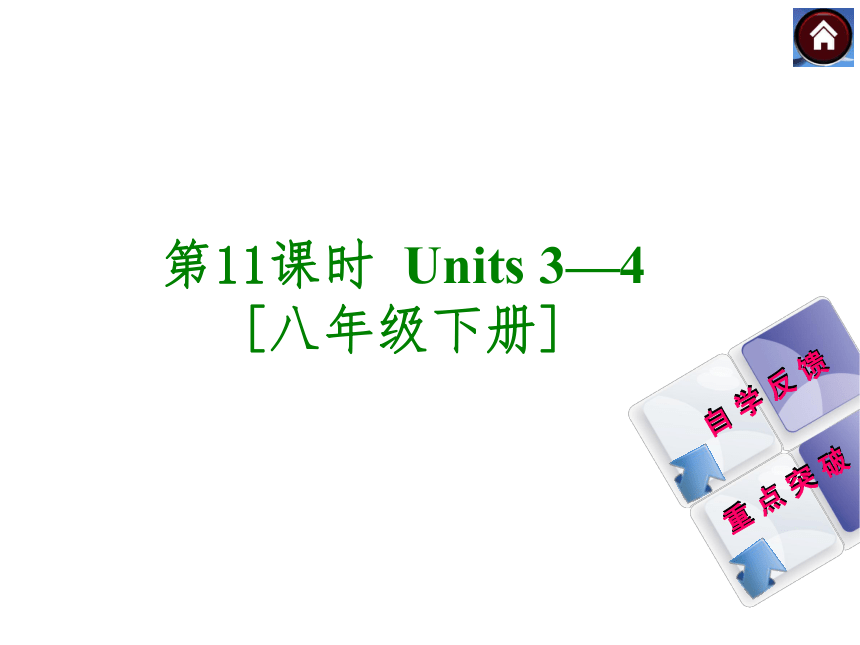
|
|
| 格式 | zip | ||
| 文件大小 | 931.9KB | ||
| 资源类型 | 教案 | ||
| 版本资源 | 外研版 | ||
| 科目 | 英语 | ||
| 更新时间 | 2015-01-19 00:00:00 | ||
图片预览

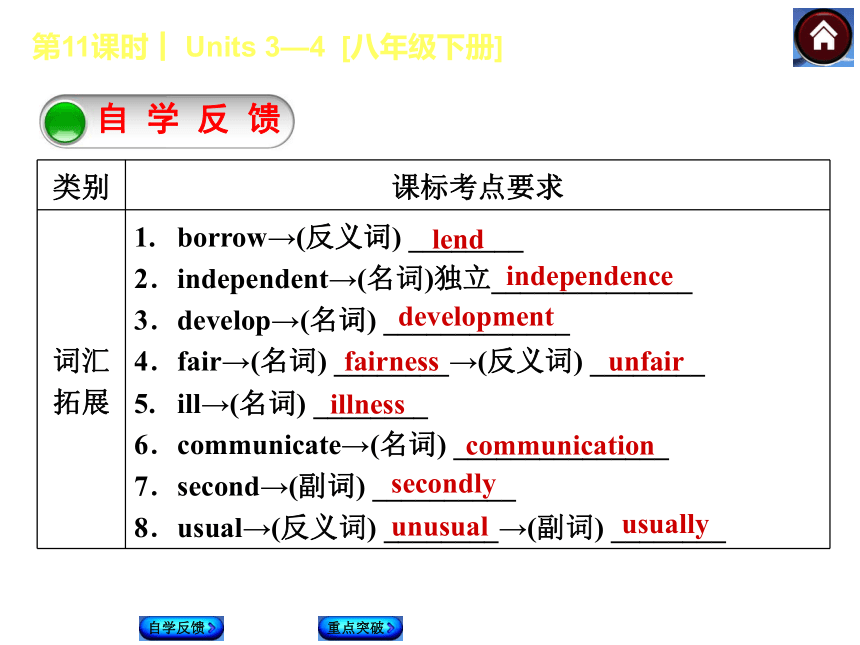
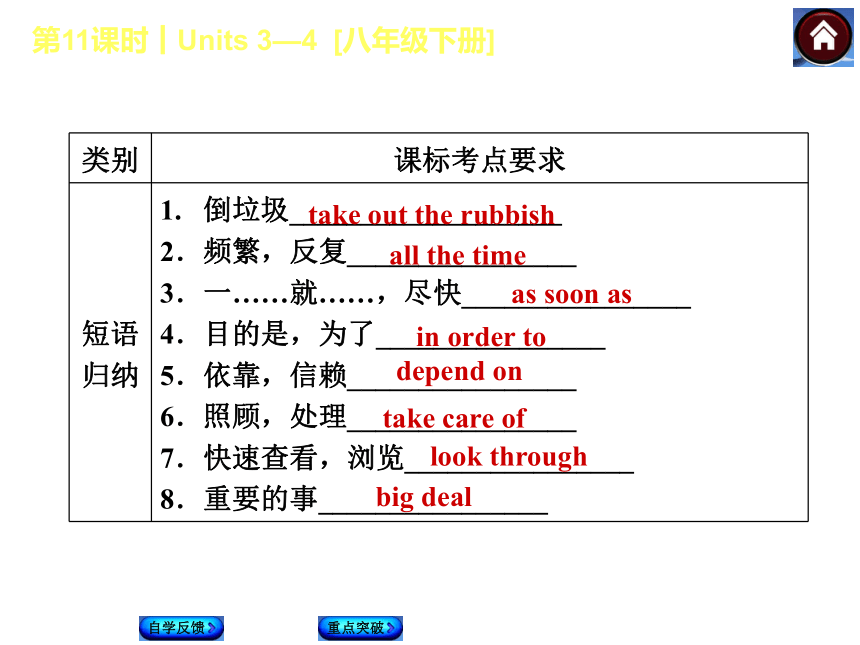
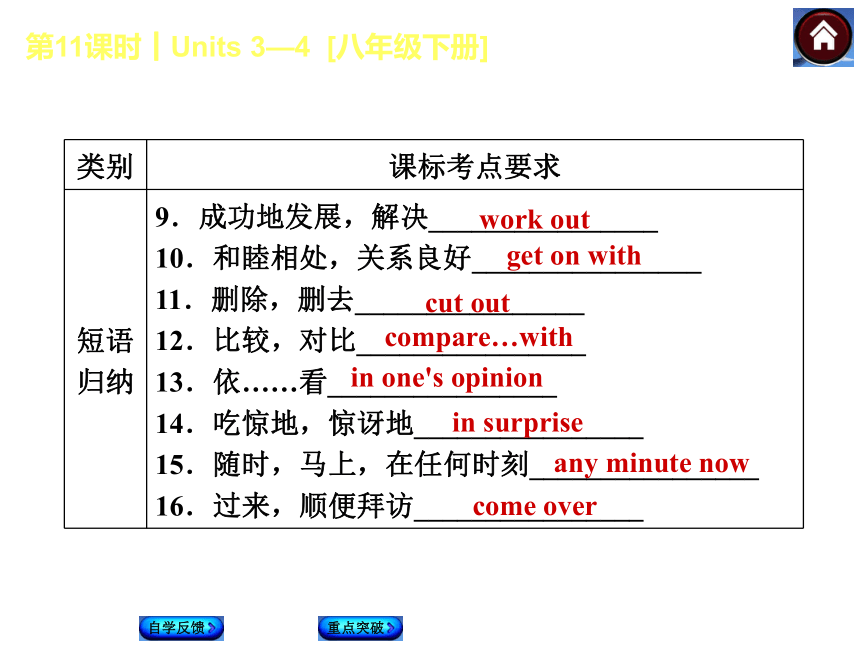
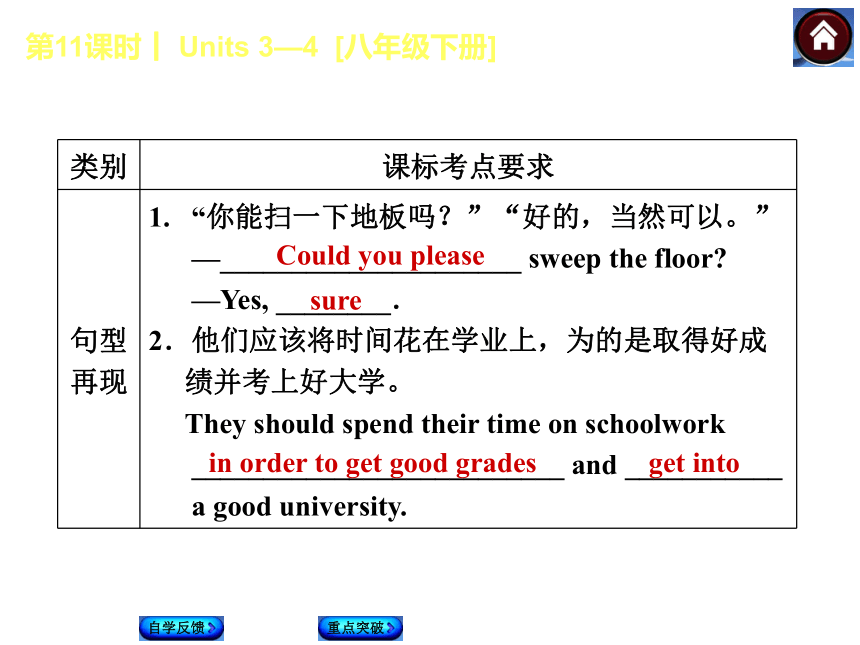
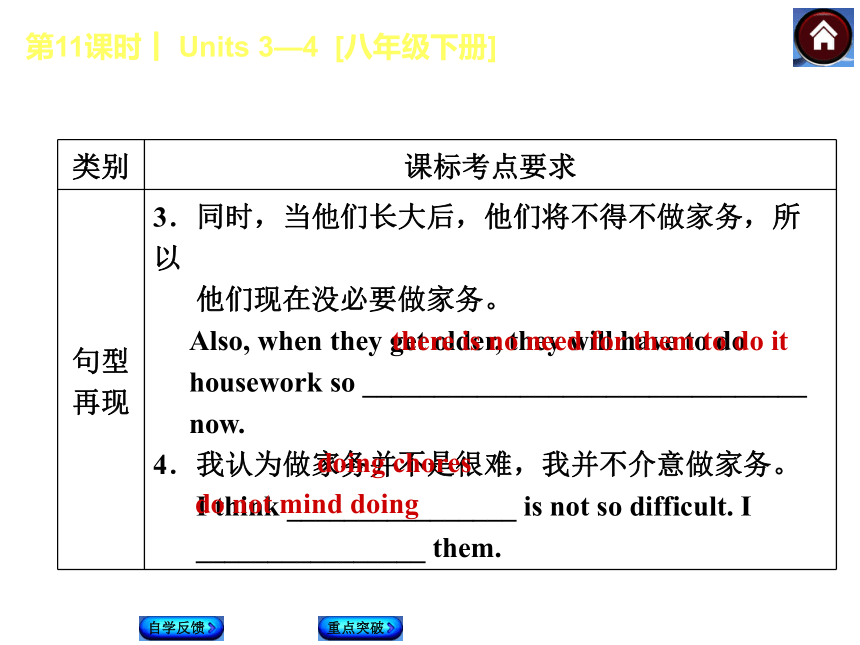
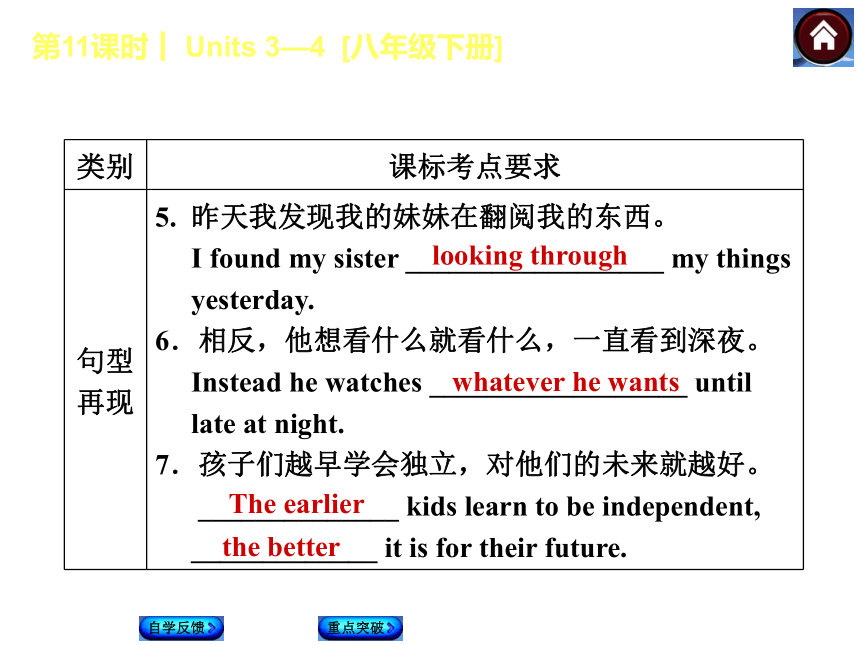
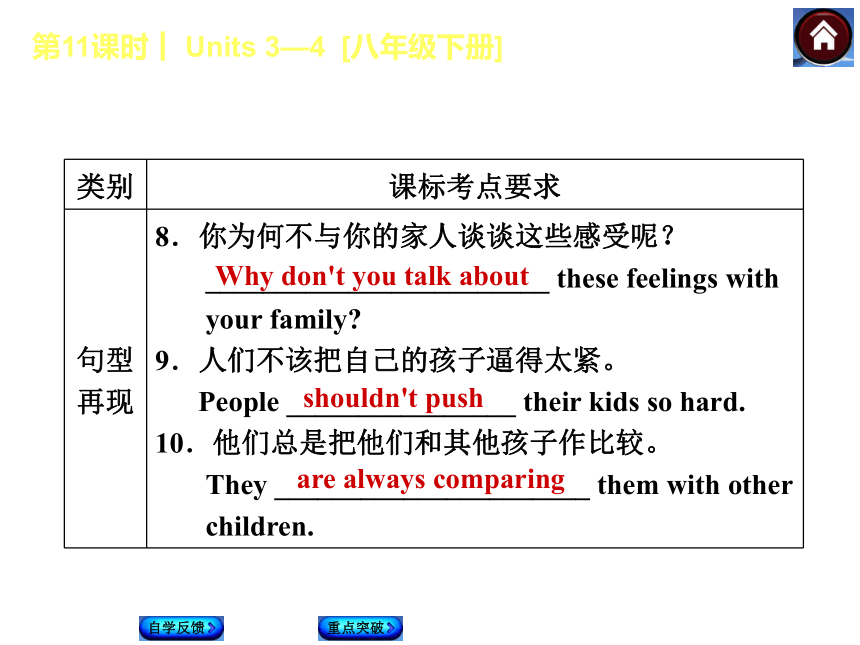
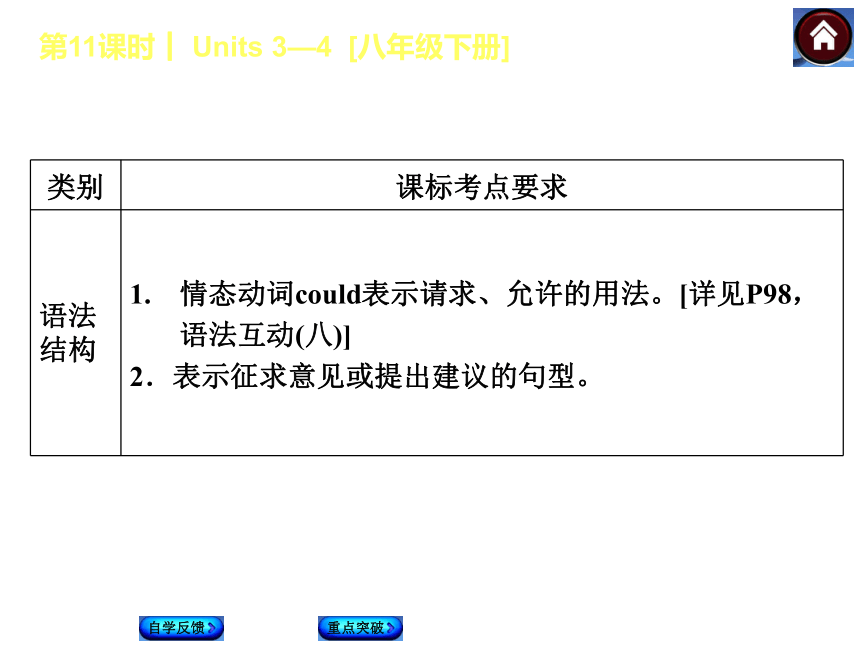
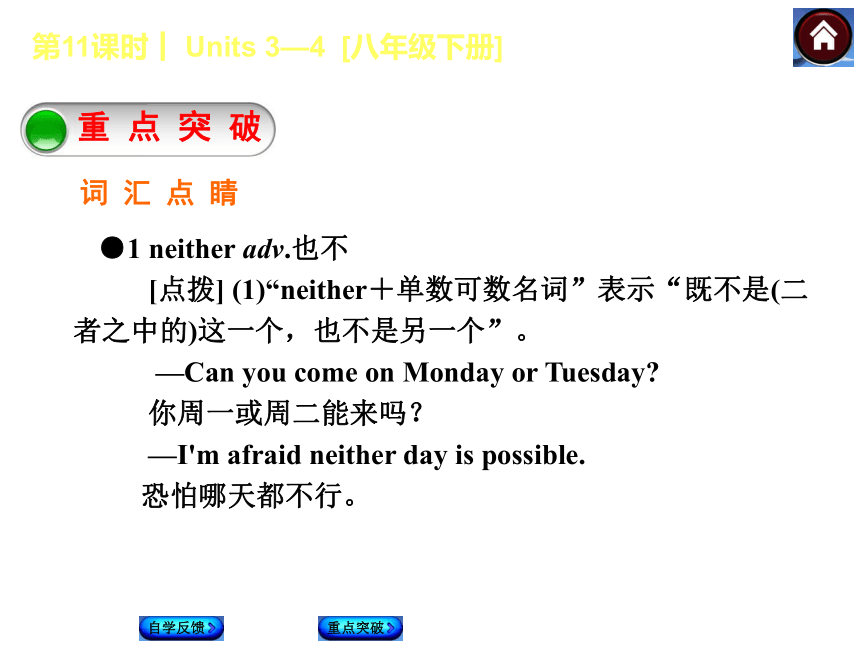
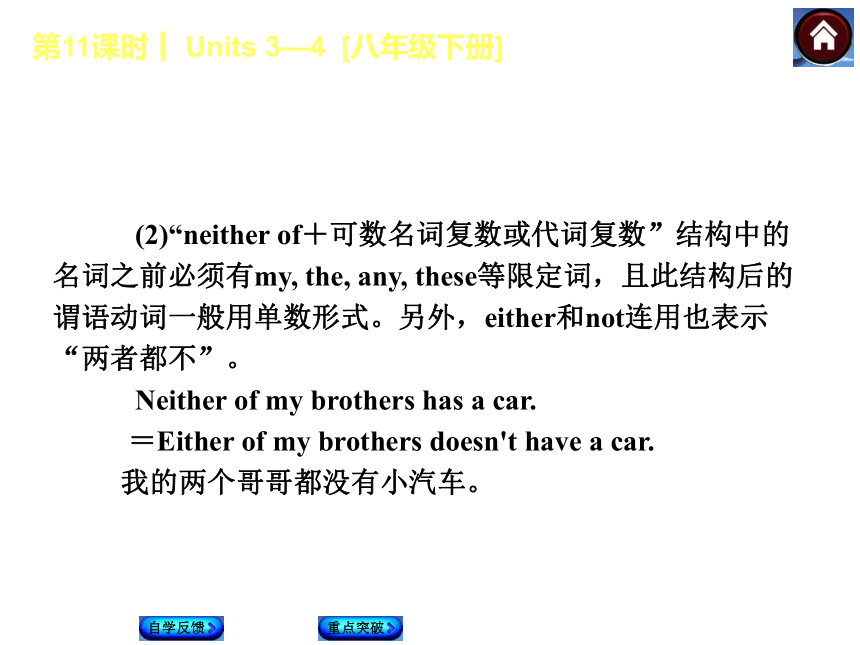
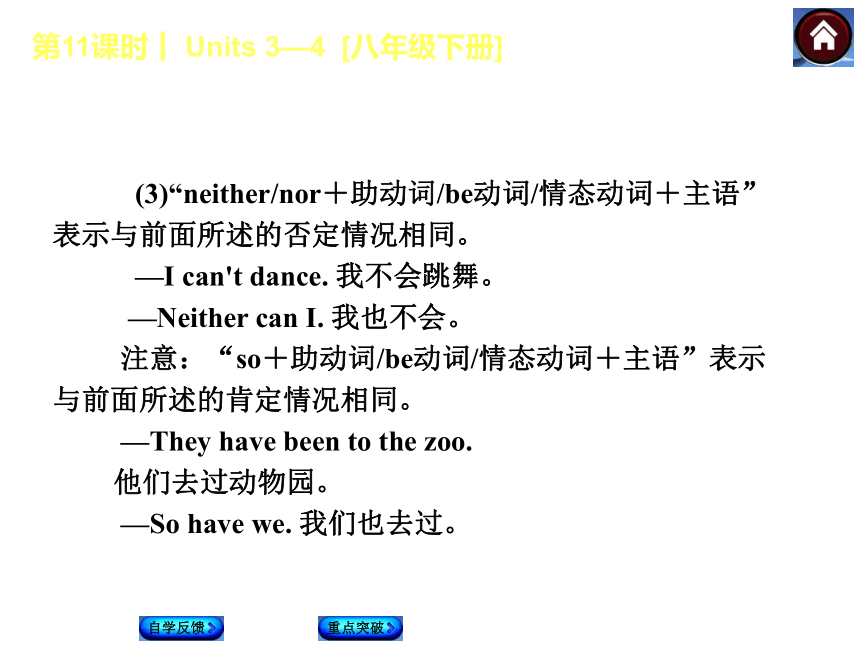
文档简介
课件52张PPT。第11课时 Units 3—4
[八年级下册] 第11课时┃ Units 3—4 [八年级下册]自 学 反 馈自学反馈重点突破lend independence development fairness unfair illness communication secondly unusual usually 第11课时┃Units 3—4 [八年级下册]take out the rubbish all the time as soon as in order to depend on take care of look through big deal 自学反馈重点突破第11课时┃Units 3—4 [八年级下册]work out get on with cut out compare…with in one's opinion in surprise any minute now come over 自学反馈重点突破第11课时┃ Units 3—4 [八年级下册]Could you please sure in order to get good grades get into 自学反馈重点突破第11课时┃ Units 3—4 [八年级下册]there is no need for them to do it doing chores do not mind doing 自学反馈重点突破第11课时┃ Units 3—4 [八年级下册]looking through whatever he wants The earlier the better 自学反馈重点突破第11课时┃ Units 3—4 [八年级下册]Why don't you talk about shouldn't push are always comparing 自学反馈重点突破第11课时┃ Units 3—4 [八年级下册]自学反馈重点突破●1 neither adv.也不
[点拨] (1)“neither+单数可数名词”表示“既不是(二者之中的)这一个,也不是另一个”。
—Can you come on Monday or Tuesday?
你周一或周二能来吗?
—I'm afraid neither day is possible.
恐怕哪天都不行。重 点 突 破词 汇 点 睛 第11课时┃ Units 3—4 [八年级下册]自学反馈重点突破 (2)“neither of+可数名词复数或代词复数”结构中的名词之前必须有my, the, any, these等限定词,且此结构后的谓语动词一般用单数形式。另外,either和not连用也表示“两者都不”。
Neither of my brothers has a car.
=Either of my brothers doesn't have a car.
我的两个哥哥都没有小汽车。第11课时┃ Units 3—4 [八年级下册]自学反馈重点突破 (3)“neither/nor+助动词/be动词/情态动词+主语”表示与前面所述的否定情况相同。
—I can't dance. 我不会跳舞。
—Neither can I. 我也不会。
注意:“so+助动词/be动词/情态动词+主语”表示与前面所述的肯定情况相同。
—They have been to the zoo.
他们去过动物园。
—So have we. 我们也去过。第11课时┃ Units 3—4 [八年级下册]自学反馈重点突破 (4)neither…nor…用来连接两个词/词组,是“both…and…”的反义词组。当neither…nor…连接两个并列主语时,谓语动词遵循“就近原则”。
He neither smokes nor drinks.
他既不抽烟也不喝酒。
Neither he nor I am a teacher.
我和他都不是老师。 第11课时┃ Units 3—4 [八年级下册]自学反馈重点突破[2014 · 广州] —Would you like tea or coffee?
—________, thanks! I'd prefer a coke.
A.Both B.Neither
C.All D.Some中考典例 B第11课时┃ Units 3—4 [八年级下册]自学反馈重点突破●2 allow v.允许,准许
[搭配] allow sb. to do sth. 允许某人做某事;
allow doing sth. 允许做某事;
sb. be allowed to do sth. 某人被允许做某事
Many people allow him to be the leading artist in his field. 很多人都承认他在这一艺术领域首屈一指。第11课时┃ Units 3—4 [八年级下册]自学反馈重点突破[2014 · 重庆] The little girl was crying because her mother didn't allow her ________ the ice-cream.
A.eat B.eats C.to eat D.ate中考典例 C第11课时┃ Units 3—4 [八年级下册]自学反馈重点突破●3 return v.归来,回来,返回
[点拨] return 相当于give back,常用于“return sth. to sb.”结构中。
Return the book to the library. 把书归还给图书馆。
[拓展] return 还可表示“回来;返回”(=come/get back),常用于“return to someplace”结构中。
She's returning to Australia tomorrow.
明天她要返回澳大利亚了。
[注意] return已含有back的意思,所以其后不能接back。第11课时┃ Units 3—4 [八年级下册]自学反馈重点突破●1 borrow/lend/keep巧 辨 异 同 第11课时┃ Units 3—4 [八年级下册]自学反馈重点突破[2014 · 烟台] —How long may I ________ your dictionary?
—For one week. But it mustn't ________ to others.
A.keep; be lent B.borrow; lend
C.lend; be borrowed D.have; borrow中考典例 A第11课时┃ Units 3—4 [八年级下册]自学反馈重点突破●2 offer/provide
(1)offer sb. sth.=offer sth. to sb.为某人提供某物;
offer to do sth. 主动提出做某事
The flight attendant offers me hot water and food.
=The flight attendant offers hot water and food to me. 空乘人员主动给我提供热水和食物。
She offers to show us around.
她主动提出带我们参观。第11课时┃ Units 3—4 [八年级下册]自学反馈重点突破第11课时┃ Units 3—4 [八年级下册] (2)provide 指为应付意外、紧急情况等做好充分准备而“供给, 提供”。provide sb. with sth.=provide sth. for sb., 意为“为某人提供某物”。
The school provides food for the students.
=The school provides the students with food.
学校为学生们提供伙食。自学反馈重点突破[2014 · 兰州] Parents often ________ their children ________ some good advice.
A.offer; with B.offer; /
C.provide; with D.both B and C中考典例 D第11课时┃ Units 3—4 [八年级下册]自学反馈重点突破●3 since/for第11课时┃ Units 3—4 [八年级下册]自学反馈重点突破 The factory has been open for a month.
=The factory has been open since a month ago.
这家工厂开业一个月了。
[注意] since还可表示原因,意为“既然,因为”。
Since it is late, I shall go home now.
由于晚了, 我现在要回家了。第11课时┃ Units 3—4 [八年级下册]自学反馈重点突破[2014 · 绵阳] —How long have you stayed in this hotel?
—Not long, just________ this Monday.
A.from B.since C.for D.on中考典例 B第11课时┃ Units 3—4 [八年级下册]自学反馈重点突破●4 instead/instead of/rather than
(1)instead是副词,意为“代替,而不是”,在句中充当状语,常用于句首,起连接上下句的作用。
Tom doesn't study hard. Instead, he plays football all day.
汤姆不努力学习,反而整天踢足球。第11课时┃ Units 3—4 [八年级下册]自学反馈重点突破 (2)instead of 和rather than都表示“代替,而不是”,两者都可接名词、代词,但前者接动词时要用v.?ing形式,后者接动词时要用原形。它们在一定情况下可相互转换。
We went there on foot instead of taking a bus.
我们没乘公共汽车,而是步行去了那儿。
She wants to go swimming tomorrow instead of playing basketball.
=She wants to go swimming tomorrow rather than play basketball.
=She doesn't want to play basketball. She wants to go swimming instead.
她明天想去游泳,而不是打篮球。第11课时┃ Units 3—4 [八年级下册]自学反馈重点突破Because of the bad weather, he stayed at home ________ going to work.
A.more than B.instead of
C.rather than D.to经典例题 B第11课时┃ Units 3—4 [八年级下册]自学反馈重点突破●1 —Could you please sweep the floor?
你能扫一下地板吗?
—Yes, sure. 好的,当然可以。
[句型] “Could you (please) + 动词原形?”意为“请你……好吗?”其否定式为“Could you (please) not+动词原形?”肯定回答:Yes, sure/certainly/of course.否定回答: Sorry, I can't.
—Could you please answer the telephone?
请你接电话好吗?
—Sure./Sorry, I can't. I'm too busy now.
当然可以。/对不起,我不能,我现在太忙。句 型 透 视 第11课时┃ Units 3—4 [八年级下册]自学反馈重点突破 [拓展] (1)当could用作情态动词can的过去式时,表示过去的能力,肯定和否定回答仍用could。
—Could you swim when you were five?
你五岁时会游泳吗?
—Yes, I could. 是的,我会。
(2)could 还可表示推测,意为“可能”。
—Do you know where Peter is?
你知道彼得在哪儿吗?
—He could be in the library. 他可能在图书馆。第11课时┃ Units 3—4 [八年级下册]自学反馈重点突破[2014 · 巴中] —Could you please not run in the hallways?
—________.
A.Sure. I'll do it right away
B.No, not at all
C.Sorry. I won't do it again中考典例 C第11课时┃ Units 3—4 [八年级下册]自学反馈重点突破●2 They should spend their time on schoolwork in order to
get good grades and get into a good university.他们应该
将时间花在学业上,为的是取得好成绩并考上好大学。
[句型] in order to do sth. 意为“为了/以便做某事”,可放在句首,也可放在句中,其否定形式为“in order not to do sth.”,意为“为了不做……”。
[拓展] “in order+that从句”也可表示“为了,以便”,从句中常用can, may, could, might等情态动词。
My father works hard in order that he may support us. 我父亲辛苦地工作是为了养家。第11课时┃ Units 3—4 [八年级下册]自学反馈重点突破[2014 · 广东] In order ________ for the meeting, my sister forced herself to get up early this morning.
A.not to be late B.not being late
C.to be late D.being late中考典例 A第11课时┃ Units 3—4 [八年级下册]自学反馈重点突破●3 Why don‘t you talk about these feelings with your family?你为何不与你的家人谈谈这些感受呢?
[句型] “Why don't you do …?”是提建议的句型,表示“你为什么不做……呢?”该结构相当于“Why not do sth.?”或“How/What about doing sth.?”第11课时┃ Units 3—4 [八年级下册]自学反馈重点突破 [拓展] 当征求他人意见或向他人提建议时,还可用下列句型:
Let‘s do… Shall we…?
Would you mind (not) doing…?
It's better to do… You'd better (not) do…
You should/need… Would you like to do…?
Could/Would you (please) do…?第11课时┃ Units 3—4 [八年级下册]自学反馈重点突破[2014 · 新疆] —Look! It's raining heavily! ________ take a raincoat with you?
—Well, I'll take one right now.
A.Why not
B.Why don't
C.Would you mind
D.Would you like 中考典例 A第11课时┃ Units 3—4 [八年级下册]自学反馈重点突破Ⅰ.单项选择
1.—May I ________ the English dictionary?
—Yes. You can ________ it for two weeks.
A.borrow; lend B.borrow; borrow
C.borrow; keep D.lend; keep
2.—________ buy a scarf?
—Good idea!
A.Why don't B.Why not
C.What about D.Would you likeCB第11课时┃ Units 3—4 [八年级下册]自学反馈重点突破3.We________ to smoke in public.
A.don't allow B.aren't allowed
C.will allow D.won't allow
4.We've got no coffee. Let's have tea ________.
A.either B.however
C.yet D.instead
5.—Could you go shopping with me tomorrow?
—________. My father and I will go to Wuhan tomorrow.
A.I think so
B.Yes, I hope so
C.I'm afraid so
D.Sorry, I'm afraid I can't BDD第11课时┃ Units 3—4 [八年级下册]自学反馈重点突破Ⅱ.连词成句
1.of, them, home, is, at, neither
____________________________.
2.family, for, we, provide, will, the, food
__________________________________.
3.yesterday, return, he, me, the, to, dictionary
________________________________________.
4.bus, I, up, in, to, catch, the, first, get, early, order
_______________________________________.
5.help, boy, the, always, me, give
____________________________.Neither of them is at home We will provide food for the familyYesterday he returned the dictionary to me I got up early in order to catch the first busThe boy always gives me help第11课时┃ Units 3—4 [八年级下册]自学反馈重点突破主题写作(五)┃人物故事篇主题写作 (五) 人物故事篇 人物故事类书面表达一般针对考生熟悉的著名人物或者同学、朋友来设题,要求考生对人物进行描写。主要涉及描写人物的简历、变化以及自己对此人物的看法等。此类试题通常以要点提示或者表格提示的方式来考查。 1.My friend Jenny comes from New York.
2.She has a round face and often wears a pair of glasses.
3.He often helps his classmates with the homework, and also helps the people in trouble.
4.I want to be a person like Helen from now and get along well with everyone.
5.I miss so many good friends, especially my best friend—David. 主题写作(五)┃人物故事篇 6.He is a 15-year-old student, who is outgoing.
7.He is good at playing basketball.
8.I hope that he will become a famous person in the future and we can keep in touch with each other. 主题写作(五)┃人物故事篇 在初中三年的英语学习中,Daniel的善良和助人为乐等优秀品质给同学们留下了深刻的印象。请根据下表提示,用英语写一篇题为“My Friend Daniel”的短文。
注意:1.词数:80词左右(文章开头已给出,不计入总词数);
2.文章必须包含表格所提供的主要信息,并作适当
发挥。主题写作(五)┃人物故事篇主题写作(五)┃人物故事篇 My Friend Daniel
My friend Daniel comes from Beijing Sunshine Secondary School. He ______________________________ __________________________________________________主题写作(五)┃人物故事篇【审题思路】
1.找出关键点:外貌、爱好、性格特征;
2.列出提纲。从以上三个方面简单列出提纲;
3.明确时态:主要使用一般现在时;
4.确定人称:第三人称。 主题写作(五)┃人物故事篇【写作模板】主题写作(五)┃人物故事篇【佳作赏析】
My Friend Daniel
My friend Daniel comes from Beijing Sunshine Secondary School. He has a round face and often wears a pair of glasses (结合要点:描写图片中人物的长相). He is good at playing computer games (结合要点:写擅长玩电脑游戏), but (转折词的使用,使行文跌宕起伏) he dislikes sports. He has many good personalities. He is helpful (结合要点:写乐于助人). He often (频度副词的使用,使文章流畅自然) helps his classmates with the homework, and also (副词的使用,使文章过渡自然) helps the old cross the road. He is kind to others (结合要点:写对人友善). 主题写作(五)┃人物故事篇He works at the Helping Hands Club. He is willing to help the people in need. He is also creative (结合要点:写有创造性). For example (举例说明,使文章生动), he can create a TV program. He is generous to his friends (结合要点:适当展开). He likes to share his things with them. So (so一词引出作者学到的内容) I want to be a person like Daniel from now and get along well with everyone.主题写作(五)┃人物故事篇 亲爱的同学,你即将初中毕业了。在这三年的学习生活中,你一定结交了许多好朋友,请你用英语写一篇短文,介绍一下你的好朋友Li Lei。
要点如下:
1.他乐于助人,性格外向,兴趣广泛;
2.他成绩优秀,经常在学习上帮助我;
3.我准备送他一个……以表达感谢;
4.我对他的祝福和希望。主题写作(五)┃人物故事篇注意:
1.词数80-100;开头已写好,不计入总词数;
2.短文须包括所有要点,不要逐词翻译,可适当增加细节,以使行文连贯。主题写作(五)┃人物故事篇 We are graduating from school soon. I miss so many good friends, especially my best friend—Li Lei.
________________________________________________________________________________________________________________________________________________________________________________________________________________________________________________________________________________________
____________________________________________________________________________________________________________________________________________________________________________________ He is a 15-year-old student, who is outgoing. He is always willing to help others. He has lots of interests such as swimming, reading and drawing. He is good at all the subjects and he often helps me with my lessons so that I can keep up with my classmates.
We are going to leave school. I'll send him a pen to thank him for helping me so much. I hope that he will become a famous person in the future. And we can keep in touch with each other. 主题写作(五)┃人物故事篇
[八年级下册] 第11课时┃ Units 3—4 [八年级下册]自 学 反 馈自学反馈重点突破lend independence development fairness unfair illness communication secondly unusual usually 第11课时┃Units 3—4 [八年级下册]take out the rubbish all the time as soon as in order to depend on take care of look through big deal 自学反馈重点突破第11课时┃Units 3—4 [八年级下册]work out get on with cut out compare…with in one's opinion in surprise any minute now come over 自学反馈重点突破第11课时┃ Units 3—4 [八年级下册]Could you please sure in order to get good grades get into 自学反馈重点突破第11课时┃ Units 3—4 [八年级下册]there is no need for them to do it doing chores do not mind doing 自学反馈重点突破第11课时┃ Units 3—4 [八年级下册]looking through whatever he wants The earlier the better 自学反馈重点突破第11课时┃ Units 3—4 [八年级下册]Why don't you talk about shouldn't push are always comparing 自学反馈重点突破第11课时┃ Units 3—4 [八年级下册]自学反馈重点突破●1 neither adv.也不
[点拨] (1)“neither+单数可数名词”表示“既不是(二者之中的)这一个,也不是另一个”。
—Can you come on Monday or Tuesday?
你周一或周二能来吗?
—I'm afraid neither day is possible.
恐怕哪天都不行。重 点 突 破词 汇 点 睛 第11课时┃ Units 3—4 [八年级下册]自学反馈重点突破 (2)“neither of+可数名词复数或代词复数”结构中的名词之前必须有my, the, any, these等限定词,且此结构后的谓语动词一般用单数形式。另外,either和not连用也表示“两者都不”。
Neither of my brothers has a car.
=Either of my brothers doesn't have a car.
我的两个哥哥都没有小汽车。第11课时┃ Units 3—4 [八年级下册]自学反馈重点突破 (3)“neither/nor+助动词/be动词/情态动词+主语”表示与前面所述的否定情况相同。
—I can't dance. 我不会跳舞。
—Neither can I. 我也不会。
注意:“so+助动词/be动词/情态动词+主语”表示与前面所述的肯定情况相同。
—They have been to the zoo.
他们去过动物园。
—So have we. 我们也去过。第11课时┃ Units 3—4 [八年级下册]自学反馈重点突破 (4)neither…nor…用来连接两个词/词组,是“both…and…”的反义词组。当neither…nor…连接两个并列主语时,谓语动词遵循“就近原则”。
He neither smokes nor drinks.
他既不抽烟也不喝酒。
Neither he nor I am a teacher.
我和他都不是老师。 第11课时┃ Units 3—4 [八年级下册]自学反馈重点突破[2014 · 广州] —Would you like tea or coffee?
—________, thanks! I'd prefer a coke.
A.Both B.Neither
C.All D.Some中考典例 B第11课时┃ Units 3—4 [八年级下册]自学反馈重点突破●2 allow v.允许,准许
[搭配] allow sb. to do sth. 允许某人做某事;
allow doing sth. 允许做某事;
sb. be allowed to do sth. 某人被允许做某事
Many people allow him to be the leading artist in his field. 很多人都承认他在这一艺术领域首屈一指。第11课时┃ Units 3—4 [八年级下册]自学反馈重点突破[2014 · 重庆] The little girl was crying because her mother didn't allow her ________ the ice-cream.
A.eat B.eats C.to eat D.ate中考典例 C第11课时┃ Units 3—4 [八年级下册]自学反馈重点突破●3 return v.归来,回来,返回
[点拨] return 相当于give back,常用于“return sth. to sb.”结构中。
Return the book to the library. 把书归还给图书馆。
[拓展] return 还可表示“回来;返回”(=come/get back),常用于“return to someplace”结构中。
She's returning to Australia tomorrow.
明天她要返回澳大利亚了。
[注意] return已含有back的意思,所以其后不能接back。第11课时┃ Units 3—4 [八年级下册]自学反馈重点突破●1 borrow/lend/keep巧 辨 异 同 第11课时┃ Units 3—4 [八年级下册]自学反馈重点突破[2014 · 烟台] —How long may I ________ your dictionary?
—For one week. But it mustn't ________ to others.
A.keep; be lent B.borrow; lend
C.lend; be borrowed D.have; borrow中考典例 A第11课时┃ Units 3—4 [八年级下册]自学反馈重点突破●2 offer/provide
(1)offer sb. sth.=offer sth. to sb.为某人提供某物;
offer to do sth. 主动提出做某事
The flight attendant offers me hot water and food.
=The flight attendant offers hot water and food to me. 空乘人员主动给我提供热水和食物。
She offers to show us around.
她主动提出带我们参观。第11课时┃ Units 3—4 [八年级下册]自学反馈重点突破第11课时┃ Units 3—4 [八年级下册] (2)provide 指为应付意外、紧急情况等做好充分准备而“供给, 提供”。provide sb. with sth.=provide sth. for sb., 意为“为某人提供某物”。
The school provides food for the students.
=The school provides the students with food.
学校为学生们提供伙食。自学反馈重点突破[2014 · 兰州] Parents often ________ their children ________ some good advice.
A.offer; with B.offer; /
C.provide; with D.both B and C中考典例 D第11课时┃ Units 3—4 [八年级下册]自学反馈重点突破●3 since/for第11课时┃ Units 3—4 [八年级下册]自学反馈重点突破 The factory has been open for a month.
=The factory has been open since a month ago.
这家工厂开业一个月了。
[注意] since还可表示原因,意为“既然,因为”。
Since it is late, I shall go home now.
由于晚了, 我现在要回家了。第11课时┃ Units 3—4 [八年级下册]自学反馈重点突破[2014 · 绵阳] —How long have you stayed in this hotel?
—Not long, just________ this Monday.
A.from B.since C.for D.on中考典例 B第11课时┃ Units 3—4 [八年级下册]自学反馈重点突破●4 instead/instead of/rather than
(1)instead是副词,意为“代替,而不是”,在句中充当状语,常用于句首,起连接上下句的作用。
Tom doesn't study hard. Instead, he plays football all day.
汤姆不努力学习,反而整天踢足球。第11课时┃ Units 3—4 [八年级下册]自学反馈重点突破 (2)instead of 和rather than都表示“代替,而不是”,两者都可接名词、代词,但前者接动词时要用v.?ing形式,后者接动词时要用原形。它们在一定情况下可相互转换。
We went there on foot instead of taking a bus.
我们没乘公共汽车,而是步行去了那儿。
She wants to go swimming tomorrow instead of playing basketball.
=She wants to go swimming tomorrow rather than play basketball.
=She doesn't want to play basketball. She wants to go swimming instead.
她明天想去游泳,而不是打篮球。第11课时┃ Units 3—4 [八年级下册]自学反馈重点突破Because of the bad weather, he stayed at home ________ going to work.
A.more than B.instead of
C.rather than D.to经典例题 B第11课时┃ Units 3—4 [八年级下册]自学反馈重点突破●1 —Could you please sweep the floor?
你能扫一下地板吗?
—Yes, sure. 好的,当然可以。
[句型] “Could you (please) + 动词原形?”意为“请你……好吗?”其否定式为“Could you (please) not+动词原形?”肯定回答:Yes, sure/certainly/of course.否定回答: Sorry, I can't.
—Could you please answer the telephone?
请你接电话好吗?
—Sure./Sorry, I can't. I'm too busy now.
当然可以。/对不起,我不能,我现在太忙。句 型 透 视 第11课时┃ Units 3—4 [八年级下册]自学反馈重点突破 [拓展] (1)当could用作情态动词can的过去式时,表示过去的能力,肯定和否定回答仍用could。
—Could you swim when you were five?
你五岁时会游泳吗?
—Yes, I could. 是的,我会。
(2)could 还可表示推测,意为“可能”。
—Do you know where Peter is?
你知道彼得在哪儿吗?
—He could be in the library. 他可能在图书馆。第11课时┃ Units 3—4 [八年级下册]自学反馈重点突破[2014 · 巴中] —Could you please not run in the hallways?
—________.
A.Sure. I'll do it right away
B.No, not at all
C.Sorry. I won't do it again中考典例 C第11课时┃ Units 3—4 [八年级下册]自学反馈重点突破●2 They should spend their time on schoolwork in order to
get good grades and get into a good university.他们应该
将时间花在学业上,为的是取得好成绩并考上好大学。
[句型] in order to do sth. 意为“为了/以便做某事”,可放在句首,也可放在句中,其否定形式为“in order not to do sth.”,意为“为了不做……”。
[拓展] “in order+that从句”也可表示“为了,以便”,从句中常用can, may, could, might等情态动词。
My father works hard in order that he may support us. 我父亲辛苦地工作是为了养家。第11课时┃ Units 3—4 [八年级下册]自学反馈重点突破[2014 · 广东] In order ________ for the meeting, my sister forced herself to get up early this morning.
A.not to be late B.not being late
C.to be late D.being late中考典例 A第11课时┃ Units 3—4 [八年级下册]自学反馈重点突破●3 Why don‘t you talk about these feelings with your family?你为何不与你的家人谈谈这些感受呢?
[句型] “Why don't you do …?”是提建议的句型,表示“你为什么不做……呢?”该结构相当于“Why not do sth.?”或“How/What about doing sth.?”第11课时┃ Units 3—4 [八年级下册]自学反馈重点突破 [拓展] 当征求他人意见或向他人提建议时,还可用下列句型:
Let‘s do… Shall we…?
Would you mind (not) doing…?
It's better to do… You'd better (not) do…
You should/need… Would you like to do…?
Could/Would you (please) do…?第11课时┃ Units 3—4 [八年级下册]自学反馈重点突破[2014 · 新疆] —Look! It's raining heavily! ________ take a raincoat with you?
—Well, I'll take one right now.
A.Why not
B.Why don't
C.Would you mind
D.Would you like 中考典例 A第11课时┃ Units 3—4 [八年级下册]自学反馈重点突破Ⅰ.单项选择
1.—May I ________ the English dictionary?
—Yes. You can ________ it for two weeks.
A.borrow; lend B.borrow; borrow
C.borrow; keep D.lend; keep
2.—________ buy a scarf?
—Good idea!
A.Why don't B.Why not
C.What about D.Would you likeCB第11课时┃ Units 3—4 [八年级下册]自学反馈重点突破3.We________ to smoke in public.
A.don't allow B.aren't allowed
C.will allow D.won't allow
4.We've got no coffee. Let's have tea ________.
A.either B.however
C.yet D.instead
5.—Could you go shopping with me tomorrow?
—________. My father and I will go to Wuhan tomorrow.
A.I think so
B.Yes, I hope so
C.I'm afraid so
D.Sorry, I'm afraid I can't BDD第11课时┃ Units 3—4 [八年级下册]自学反馈重点突破Ⅱ.连词成句
1.of, them, home, is, at, neither
____________________________.
2.family, for, we, provide, will, the, food
__________________________________.
3.yesterday, return, he, me, the, to, dictionary
________________________________________.
4.bus, I, up, in, to, catch, the, first, get, early, order
_______________________________________.
5.help, boy, the, always, me, give
____________________________.Neither of them is at home We will provide food for the familyYesterday he returned the dictionary to me I got up early in order to catch the first busThe boy always gives me help第11课时┃ Units 3—4 [八年级下册]自学反馈重点突破主题写作(五)┃人物故事篇主题写作 (五) 人物故事篇 人物故事类书面表达一般针对考生熟悉的著名人物或者同学、朋友来设题,要求考生对人物进行描写。主要涉及描写人物的简历、变化以及自己对此人物的看法等。此类试题通常以要点提示或者表格提示的方式来考查。 1.My friend Jenny comes from New York.
2.She has a round face and often wears a pair of glasses.
3.He often helps his classmates with the homework, and also helps the people in trouble.
4.I want to be a person like Helen from now and get along well with everyone.
5.I miss so many good friends, especially my best friend—David. 主题写作(五)┃人物故事篇 6.He is a 15-year-old student, who is outgoing.
7.He is good at playing basketball.
8.I hope that he will become a famous person in the future and we can keep in touch with each other. 主题写作(五)┃人物故事篇 在初中三年的英语学习中,Daniel的善良和助人为乐等优秀品质给同学们留下了深刻的印象。请根据下表提示,用英语写一篇题为“My Friend Daniel”的短文。
注意:1.词数:80词左右(文章开头已给出,不计入总词数);
2.文章必须包含表格所提供的主要信息,并作适当
发挥。主题写作(五)┃人物故事篇主题写作(五)┃人物故事篇 My Friend Daniel
My friend Daniel comes from Beijing Sunshine Secondary School. He ______________________________ __________________________________________________主题写作(五)┃人物故事篇【审题思路】
1.找出关键点:外貌、爱好、性格特征;
2.列出提纲。从以上三个方面简单列出提纲;
3.明确时态:主要使用一般现在时;
4.确定人称:第三人称。 主题写作(五)┃人物故事篇【写作模板】主题写作(五)┃人物故事篇【佳作赏析】
My Friend Daniel
My friend Daniel comes from Beijing Sunshine Secondary School. He has a round face and often wears a pair of glasses (结合要点:描写图片中人物的长相). He is good at playing computer games (结合要点:写擅长玩电脑游戏), but (转折词的使用,使行文跌宕起伏) he dislikes sports. He has many good personalities. He is helpful (结合要点:写乐于助人). He often (频度副词的使用,使文章流畅自然) helps his classmates with the homework, and also (副词的使用,使文章过渡自然) helps the old cross the road. He is kind to others (结合要点:写对人友善). 主题写作(五)┃人物故事篇He works at the Helping Hands Club. He is willing to help the people in need. He is also creative (结合要点:写有创造性). For example (举例说明,使文章生动), he can create a TV program. He is generous to his friends (结合要点:适当展开). He likes to share his things with them. So (so一词引出作者学到的内容) I want to be a person like Daniel from now and get along well with everyone.主题写作(五)┃人物故事篇 亲爱的同学,你即将初中毕业了。在这三年的学习生活中,你一定结交了许多好朋友,请你用英语写一篇短文,介绍一下你的好朋友Li Lei。
要点如下:
1.他乐于助人,性格外向,兴趣广泛;
2.他成绩优秀,经常在学习上帮助我;
3.我准备送他一个……以表达感谢;
4.我对他的祝福和希望。主题写作(五)┃人物故事篇注意:
1.词数80-100;开头已写好,不计入总词数;
2.短文须包括所有要点,不要逐词翻译,可适当增加细节,以使行文连贯。主题写作(五)┃人物故事篇 We are graduating from school soon. I miss so many good friends, especially my best friend—Li Lei.
________________________________________________________________________________________________________________________________________________________________________________________________________________________________________________________________________________________
____________________________________________________________________________________________________________________________________________________________________________________ He is a 15-year-old student, who is outgoing. He is always willing to help others. He has lots of interests such as swimming, reading and drawing. He is good at all the subjects and he often helps me with my lessons so that I can keep up with my classmates.
We are going to leave school. I'll send him a pen to thank him for helping me so much. I hope that he will become a famous person in the future. And we can keep in touch with each other. 主题写作(五)┃人物故事篇
